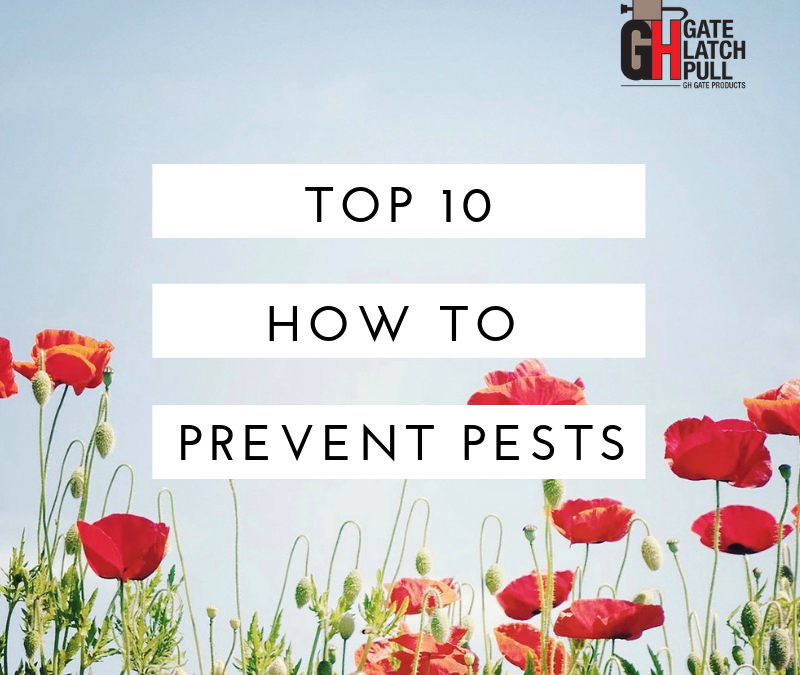Growing a garden can be fun, rewarding, and is a great way to eat fresh produce while saving money. However, gardening does require work too and there’s nothing more frustrating than pests coming along to destroy it.
Fortunately, there are a variety of ways to prevent pests. Of course there are the traditional chemical methods, but with so many natural options, why not protect your garden without pesticides and risking the health of you and your family.
Below are ten tips for controlling pests in your garden:
#1 Healthy Soil:
One of the best ways to prevent pests is with healthy soil. Here are a few items that can be added to plant soil.
• Kelp powder sprinkled around the plants provides nutrients, and plant leaves can be spritzed with a kelp tea, which nourishes the entire plant.
• Bone and blood meal fertilizer is rich with nitrogen that provides the plants with energy to grow and produce vegetation.
• Fish emulsion is also full of nitrogen, along with potassium and phosphorous.
• Yarrow flowers add nutrients to the soil and act as a natural pest-repellant.
Healthy plants have stronger immune systems and can actually fight off pests. Enriching the plant soil with organic fertilizers will provide important nutrients essential to the production of strong, resilient plants.
#2 Use Pest Resistant Plants:
Companion planting is another method for naturally controlling pests, which involves planting certain types of plants in close proximity. This may vary for indoor plants, or newly potted cuttings or seedlings. Some seed varieties are naturally resistant to pests and using this in companion planting along with specific planting combinations will enable plants to feed and pollinate one another as well as share and enhance nutrients. Companion planting works well in both vegetable and flower gardens.
#3 Powdered Diatomaceous Earth (DE):
DE is a finely ground powder derived from the fossilized remains of small aquatic life. The skeletons of these tiny creatures are silica-rich and have razor-like edges, which kill pests. It is ideal for combating larvae, ants, earwigs, aphids, cockroaches, snails, slugs or slugs. It can be sprinkled onto plants by hand or with a dust applicator bottle. Following a rain shower, DE will need to be reapplied to plants. It is also safe for indoor use ridding your home of ants. The food-grade version is safe your people and pets and can be consumed as an internal parasite cleanse.
#4 Neem Oil:
Derived from the oils pressed from seeds and fruits, neem oil fights more than 200 species of garden insects. The solution ideal for garden use is easily made by mixing ½ teaspoon of dish soap, 1 teaspoon of cold-pressed neem oil, into a quart of warm water. Spray the plants thoroughly, applying after a rain shower. Without rain, the mixture can help protect plants up to 20 days.
#5 Lemon Balm Tea:
When used at least twice a week, the lemon balm tea will repel aphids and squash bugs.
#6 Garlic Spray:
Garlic has natural anti-fungal, antibacterial, and antiviral properties that work well not only for your health but is also an effective way to kill insects. However, it is indiscriminate in the insects it kills, good and bad. You can prevent harming helpful insects by spraying the garlic solution only on the plants that are affected. Avoid using on fresh produce near harvest time to protect the natural food flavors.
#7 Hot Pepper Spray:
The heat and burning sensation of peppers keeps pests away. This spray is available in stores, however a more economical approach is making your own. The hot pepper spray should be applied to plants twice a week.
#8 Epsom Salt Pesticide:
This is rich in magnesium and can be an effective way for deterring garden pests like beetles and slugs, because the magnesium will burn them. Make a solution of one cup Epsom salt and five gallons of water, fill a spray bottle and apply to the plants. Another option is to sprinkle the dry salt around the base of the plant twice a month and the magnesium will provide nutrients to the plant roots, as well as prevent pests.
#9 Essential Oil Blend:
Essential oils have many natural health benefits and will also protect your garden. Different oils are effective in addressing certain issues, but for a good all-purpose bug pesticide, use 10 drops of each: eucalyptus oil, cedarwood oil, and lemon essential oil. Mix the oils with one ounce of water and apply to plants with a spray bottle.
In addition to essential oils being beneficial in the fight against garden pests, planting certain herbs will work well too. Some suggestions include basil, fennel, mint, citronella, and lemongrass.
#10 Preventing Animal Pests:
Insects are certainly some of the most bothersome pests, but animals can destroy gardens as well. Wildlife animals are a joy to observe at a distance, whether it is the elegant deer, the fuzzy bunny or cute groundhog, but when they begin destroying your garden, your affection can become skewed.
If you live in an area with wildlife, fencing is one of the best solutions for preventing destruction of a garden. A fence will usually deter deer, and rabbits. Adding chicken wire or cloth around the fence perimeter will prevent adamant groundhogs from burrowing through. Smaller animals like rabbits, squirrels, or groundhogs can also be caught in live traps and relocated.
BonusTip:
Hanging sticky traps in your garden area is useful in trapping flying insects and will also alert you to some of the garden pests you’re fighting.
In addition to the various methods here, one major factor in pest prevention is creating a less attractive environment for them. Plants that are growing thickly not only have a lack of air circulation, but also provide an ideal shelter for insects to feed and avoid predators.
Conversely, weeds and decayed plant materials encourage disease and make the perfect breeding ground for pests and fungi, so keep the surrounding plant areas clean. For example, a healthy organic lawn next to your garden will help to improve your efforts.
Make your garden as unappealing as possible to pests. After all, it is much easier and cost-effective than recovering from the damage they can cause.


Recent Comments
Original EZGT001 Gate Latch Pull In Black
Original EZGT001 Gate Latch Pull In Black
Original EZGT001 Gate Latch Pull In Black
Original EZGT001 Gate Latch Pull In Black
Original EZGT001 Gate Latch Pull In Black